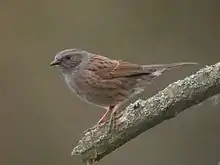List of birds of the Isle of Man
As of 2018, some 333 species of bird have been recorded in the wild on the Isle of Man, a self-governing island in the Irish Sea between Great Britain and Ireland. Over 100 species breed there, including significant populations of red-billed chough, peregrine falcon and hen harrier.[1]
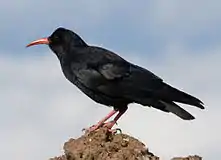
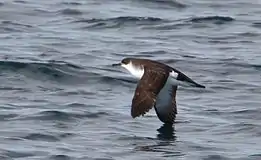
A variety of seabirds breed on the coastal cliffs such as Atlantic puffin, black guillemot, black-legged kittiwake, European shag and northern fulmar.[2] The island gives its name to the Manx shearwater which formerly nested in large numbers on the Calf of Man. The colony disappeared following the arrival of rats but the shearwaters began to return in the 1960s.[2] The Ayres in the north of the island have colonies of little tern, Arctic tern and common tern.[2]
Moorland areas on the island are home to red grouse, Eurasian curlew and northern raven.[2] Woodland birds include long-eared owl, common treecreeper, Eurasian blackcap and common chiffchaff. There is little native woodland on the island and several species found in Great Britain, such as tawny owl, Eurasian green woodpecker and Eurasian jay, do not breed on the isle of Man.
Many birds visit the island during the winter and migration seasons including waders such as purple sandpiper, turnstone and golden plover.[2] Wintering wildfowl include small numbers of whooper swan. A bird observatory was established on the Calf of Man in 1959 to study the migrating and breeding birds. By the end of 2001, 99,042 birds of 134 species had been ringed there.[3] Numerous rarities have been recorded there including American mourning dove and white-throated robin.
The list below includes 323 species of bird. The English names are those recommended by the International Ornithological Congress (IOC) with alternative names given in brackets.[4] The scientific names and classification follow the British Ornithologists' Union (BOU).[5] Species marked as rare are those for which the Manx Ornithological Society (MOS) requires a written description in order to accept a record.[6]
The Manx Ornithological Society uses the following codes:[7]
- A: a species which has occurred naturally on the island since 1 January 1950
- B: a species which has occurred naturally but only before 31 December 1949
- C: a species with an established breeding population as a result of introduction by man
- C*: a species which has visited the island from an introduced population in Great Britain
Failed introductions such as black grouse or escapee species which were briefly established in the wild such as red-winged laughingthrush are not included on the list.
Ducks, geese and swans
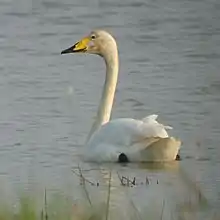
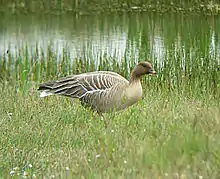
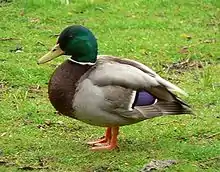
Order: Anseriformes Family: Anatidae
- Mute swan, Cygnus olor A
- Tundra swan (Bewick's swan), Cygnus columbianus A
- Whooper swan, Cygnus cygnus A
- Bean goose, Anser fabalis B, rare
- Pink-footed goose, Anser brachyrhynchus A
- Greater white-fronted goose, Anser albifrons A, rare
- Greylag goose, Anser anser AC
- Canada goose, Branta canadensis AC
- Barnacle goose, Branta leucopsis A
- Brant goose (brent goose), Branta bernicla A
- Common shelduck, Tadorna tadorna A
- Eurasian wigeon, Mareca penelope A
- American wigeon, Mareca americana A, rare
- Gadwall, Mareca strepera AC, rare
- Eurasian teal, Anas crecca A
- Green-winged teal, Anas carolinensis A, rare
- Mallard, Anas platyrhynchos AC
- Northern pintail, Anas acuta A
- Garganey, Spatula querquedula A, rare
- Northern shoveler, Spatula clypeata A
- Red-crested pochard, Netta rufina A
- Common pochard, Aythya ferina A
- Ring-necked duck, Aythya collaris A, rare
- Ferruginous duck, Aythya nyroca A, rare
- Tufted duck, Aythya fuligula A
- Greater scaup, Aythya marila A, rare
- Common eider, Somateria mollissima A
- King eider, Somateria spectabilis A, rare
- Long-tailed duck, Clangula hyemalis A
- Common scoter, Melanitta nigra A
- Surf scoter, Melanitta perspicillata A, rare
- Velvet scoter, Melanitta fusca A, rare
- Common goldeneye, Bucephala clangula A
- Smew, Mergellus albellus A, rare
- Red-breasted merganser, Mergus serrator A
- Common merganser (goosander), Mergus merganser A, rare
- Ruddy duck, Oxyura jamaicensis C*
Grouse
.jpg.webp)
Order: Galliformes Family: Tetraonidae
- Willow ptarmigan (red grouse), Lagopus lagopus A
Pheasants and partridges
Order: Galliformes Family: Phasianidae
- Red-legged partridge, Alectorix rufa C
- Grey partridge, Perdix perdix AC
- Common quail, Coturnix coturnix A
- Common pheasant, Phasianus colchicus C
Loons or divers

Order: Gaviiformes Family: Gaviidae
- Red-throated diver, Gavia stellata A
- Black-throated diver, Gavia arctica A
- Great northern diver, Gavia immer A
Petrels and shearwaters
Order: Procellariiformes Family: Procellaridae
- Northern fulmar, Fulmarus glacialis A
- Cory's shearwater, Calonectris diomedea A, rare
- Great shearwater, Ardenna gravis A, rare
- Sooty shearwater, Ardenna griseus A, rare
- Manx shearwater, Puffinus puffinus A
- Balearic shearwater, Puffinus mauretanicus A, rare
- Macaronesian shearwater, Puffinus baroli A, rare
Northern storm petrels
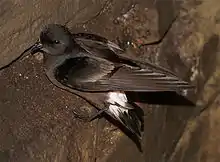
Order: Procellariiformes Family: Hydrobatidae
- European storm petrel, Hydrobates pelagicus A
- Leach's storm petrel, Oceanodroma leucorrhoa A, rare
Cormorants
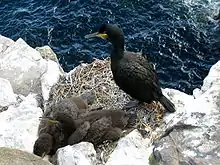
Order: Suliformes Family: Phalacrocoracidae
- Great cormorant, Phalacrocorax carbo A
- European shag, Phalacrocorax aristotelis A
Frigatebirds
Order: Suliformes Family: Fregatidae
- Magnificent frigatebird, Fregata magnificens A, rare
Herons and bitterns
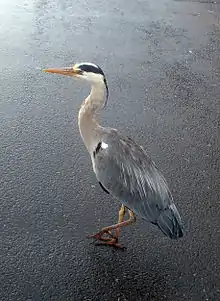
Order: Pelecaniformes Family: Ardeidae
- Eurasian bittern, Botaurus stellaris A, rare
- Little bittern, Ixobrychus minutus A, rare
- Black-crowned night heron, Nycticorax nycticorax A, rare
- Cattle egret, Bubulcus ibis A, rare
- Little egret, Egretta garzetta A, formerly rare, now resident
- Great egret, Ardea alba A, rare
- Grey heron, Ardea cinerea A
- Purple heron, Ardea purpurea A, rare
Spoonbills
Order: Pelecaniformes Family: Threskiornithidae
- Eurasian spoonbill, Platalea leucorodia A, rare
Grebes
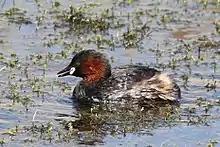
Order: Podicipediformes Family: Podicipedidae
- Little grebe, Tachybaptus ruficollis A
- Great crested grebe, Podiceps cristatus A
- Red-necked grebe, Podiceps grisegena A, rare
- Slavonian grebe, Podiceps auritus A, rare
- Black-necked grebe, Podiceps nigricollis A, rare
Hawks and eagles
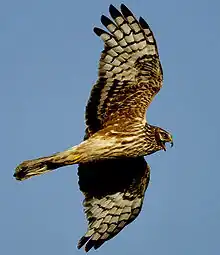
Order: Accipitriformes Family: Accipitridae
- European honey buzzard, Pernis apivorus A, rare
- Black kite, Milvus migrans A, rare
- Red kite, Milvus milvus AC*, rare
- White-tailed eagle, Haliaaetus albicilla B, rare
- Western marsh harrier, Circus aeruginosus A, rare
- Hen harrier Circus cyaneus A
- Northern goshawk, Accipiter gentilis AC*, rare
- Eurasian sparrowhawk, Accipiter nisus A
- Common buzzard, Buteo buteo A, formerly rare but now breeding and relatively common
- Rough-legged buzzard, Buteo lagopus A, rare
- Golden eagle, Aquila chrysaetos A, rare
Falcons
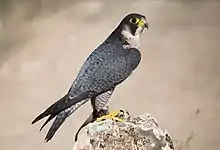
Order: Falconiformes Family: Falconidae
- Common kestrel, Falco tinnunculus A
- Red-footed falcon, Falco vespertinus A, rare
- Merlin, Falco columbarius A
- Eurasian hobby, Falco subbuteo A, rare
- Gyrfalcon, Falco rusticolus B, rare
- Peregrine falcon, Falco peregrinus A
Rails
Order: Gruiformes Family: Rallidae
- Water rail, Rallus aquaticus A
- Spotted crake, Porzana porzana B, rare
- Baillon's crake, Porzana pusilla B, rare
- Corn crake, Crex crex A, rare
- Common moorhen, Gallinula chloropus A
- Eurasian coot, Fulica atra A
Oystercatchers
.jpg.webp)
Order: Charadriiformes Family: Haematopodidae
- Eurasian oystercatcher, Haematopus ostralegus A
Stone-curlews
Order: Charadriiformes Family: Burhinidae
- Eurasian stone-curlew, Burhinus oedicnemus A, rare
Plovers
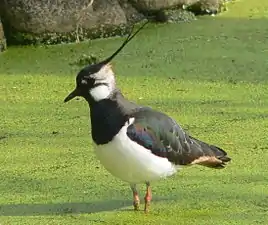
Order: Charadriiformes Family: Charadriidae
- Little ringed plover, Charadrius dubius A, rare
- Common ringed plover, Charadrius hiaticula A
- Kentish plover, Charadrius alexandrinus A, rare
- Eurasian dotterel, Charadrius morinellus A, rare
- American golden plover, Pluvialis dominica A, rare
- European golden plover, Pluvialis apricaria A
- Grey plover, Pluvialis squatarola A
- Northern lapwing, Vanellus vanellus A
Sandpipers, snipe and phalaropes
.jpg.webp)


Order: Charadriiformes Family: Scolopacidae
- Red knot, Calidris canutus A
- Sanderling, Calidris alba A
- Little stint, Calidris minuta A
- Temminck's stint, Calidris temminckii A, rare
- White-rumped sandpiper, Calidris fuscicollis A, rare
- Pectoral sandpiper, Calidris melanotos A, rare
- Curlew sandpiper, Calidris ferruginea A
- Stilt sandpiper, Calidris himantopus A, rare
- Purple sandpiper, Calidris maritima A
- Dunlin, Calidris alpina A
- Buff-breasted sandpiper, Calidris subruficollis A, rare
- Ruff, Calidris pugnax A
- Jack snipe, Lymnocryptes minimus A
- Common snipe, Gallinago gallinago A
- Great snipe, Gallinago minima B, rare
- Long-billed dowitcher, Limnodromus scolopaceus A, rare
- Eurasian woodcock, Scolopax rusticola A
- Black-tailed godwit, Limosa limosa A
- Bar-tailed godwit, Limosa lapponica A
- Eurasian whimbrel, Numenius phaeopus A
- Eurasian curlew, Numenius arquata A
- Common sandpiper, Actitis hypoleucos A
- Green sandpiper, Tringa ochropus A, rare
- Spotted redshank, Tringa erythropus A, rare
- Common greenshank, Tringa nebularia A
- Lesser yellowlegs, Tringa flavipes B, rare
- Wood sandpiper, Tringa glareola A, rare
- Common redshank, Tringa totanus A
- Ruddy turnstone, Arenaria interpres A
- Wilson's phalarope, Phalaropus tricolor A, rare
- Red-necked phalarope, Phalaropus lobatus A, rare
- Red phalarope (grey phalarope), Phalaropus fulicarius A, rare
Skuas
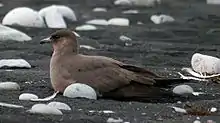
Order: Charadriiformes Family: Stercorariidae
- Pomarine skua, Stercorarius pomarinus A, rare
- Parasitic jaeger (Arctic skua), Stercorarius parasiticus A
- Long-tailed jaeger (long-tailed skua), Stercorarius longicaudus A, rare
- Great skua, Stercorarius skua A
Gulls, terns, and skimmers


Order: Charadriiformes Family: Laridae
- Sabine's gull, Xema sabini A, rare
- Black-legged kittiwake, Rissa tridactyla A
- Black-headed gull, Chroicocephalus ridibundus A
- Little gull, Hydrocoloeus minutus A, rare
- Mediterranean gull, Ichthyaetus melanocephalus A, rare
- Common gull, Larus canus A
- Ring-billed gull, Larus delawarensis A, rare
- Lesser black-backed gull, Larus fuscus A
- European herring gull, Larus argentatus A
- Yellow-legged gull, Larus michahellis A, rare
- Iceland gull, Larus glaucoides A, rare
- Glaucous gull, Larus hyperboreus A, rare
- Great black-backed gull, Larus marinus A
- Bridled tern, Onychoprion anaethetus A, rare
- Little tern, Sternula albifrons A
- Black tern, Chlidonias niger A, rare
- Sandwich tern, Thalasseus sandvicensis A
- Common tern, Sterna hirundo A
- Roseate tern, Sterna dougallii A, rare
- Arctic tern, Sterna paradisaea A
Auks
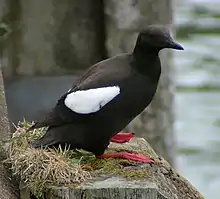
Order: Charadriiformes Family: Alcidae
- Common murre (guillemot), Uria aalge A
- Razorbill, Alca torda A
- Great auk, Pinguinus impennis B2, extinct
- Black guillemot, Cepphus grylle A
- Little auk, Alle alle A, rare
- Atlantic puffin, Fratercula arctica A
Sandgrouse
Order: Pterocliformes Family: Pteroclidae
- Pallas's sandgrouse, Syrrhaptes paradoxus B, rare
Pigeons and doves
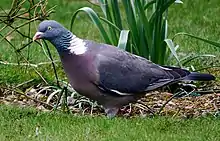
Order: Columbiformes Family: Columbidae
- Rock dove (feral pigeon), Columba livia A
- Stock dove, Columba oenas A
- Common wood pigeon, Columba palumbus A
- Eurasian collared dove, Streptopelia decaocto A
- European turtle dove, Streptopelia turtur A, rare
- Mourning dove, Zenaida macroura A, rare
Parrots
Order: Psittaciformes Family: Psittaculidae
- Rose-ringed parakeet (ring-necked parakeet), Psittacula krameri C*
Cuckoos
_by_Tim_Peukert.jpg.webp)
Order: Cuculiformes Family: Cuculidae
- Great spotted cuckoo, Clamator glandarius A, rare
- Common cuckoo, Cuculus canorus A
- Yellow-billed cuckoo, Coccyzus americanus A, rare
Typical owls
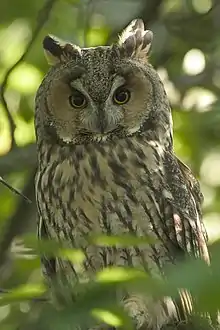
Order: Strigiformes Family: Strigidae
- Eurasian scops owl, Otus scops A, rare
- Snowy owl, Bubo scandiaca B, rare
- Little owl, Athene noctua C*, rare
- Tawny owl, Strix aluco A, rare
- Long-eared owl, Asio otus A
- Short-eared owl, Asio flammeus A
Nightjars
Order: Caprimulgiformes Family: Caprimulgidae
- European nightjar, Caprimulgus europaeus A, rare
Swifts
Order: Apodiformes Family: Apodidae
- Common swift, Apus apus A
- Alpine swift, Apus melba A, rare
Kingfishers
.jpg.webp)
Order: Coraciiformes Family: Alcedinidae
- Common kingfisher, Alcedo atthis A
Woodpeckers
Order: Piciformes Family: Picidae
- Eurasian wryneck, Jynx torquilla A, rare
- European green woodpecker, Picus viridis A, rare
- Great spotted woodpecker, Dendrocopos major A, rare
Shrikes
Order: Passeriformes Family: Laniidae
- Red-backed shrike, Lanius collurio A, rare
- Great grey shrike, Lanius excubitor A, rare
- Woodchat shrike, Lanius senator A, rare
Crows
.jpg.webp)
Order: Passeriformes Family: Corvidae
- Red-billed chough, Pyrrhocorax pyrrhocorax A
- Eurasian magpie, Pica pica A
- Eurasian jay, Garrulus glandarius A, rare
- Western jackdaw, Corvus monedula A
- Rook, Corvus frugilegus A
- Carrion crow, Corvus corone A
- Hooded crow, Corvus cornix A
- Northern raven, Corvus corax A
Kinglets
Order: Passeriformes Family: Regulidae
- Goldcrest, Regulus regulus A
- Common firecrest, Regulus ignicapilla A, rare
Tits
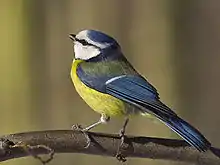
Order: Passeriformes Family: Paridae
- Eurasian blue tit, Cyanistes caeruleus A
- Great tit, Parus major A
- Coal tit, Periparus ater A
- Marsh tit, Poecile palustris A, rare
Bearded reedling
Order: Passeriformes Family: Panuridae
- Bearded reedling (bearded tit), Panurus biarmicus A, rare
Larks
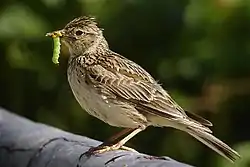
Order: Passeriformes Family: Alaudidae
- Calandra lark, Melanocorypha calandra A, rare
- Woodlark, Lullula arborea A, rare
- Eurasian skylark, Alauda arvensis A
- Horned lark (shore lark), Eremophila alpestris A, rare
Swallows and martins
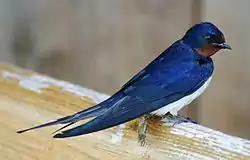
Order: Passeriformes Family: Hirundinidae
- Sand martin, Riparia riparia A
- Barn swallow, Hirundo rustica A
- Common house martin, Delichon urbicum A
Leaf warblers
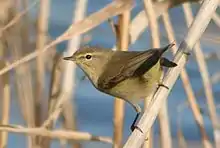
Order: Passeriformes Family: Phylloscopidae
- Greenish warbler, Phylloscopus trochiloides A, rare
- Pallas's leaf warbler, Phylloscopus proregulus A, rare
- Yellow-browed warbler, Phylloscopus inornatus A, rare
- Dusky warbler, Phylloscopus fuscatus A, rare
- Western Bonelli's warbler, Phylloscopus bonelli A, rare
- Wood warbler, Phylloscopus sibalatrix A, rare
- Chiffchaff, Phylloscopus collybita A
- Willow warbler, Phylloscopus trochilus A
Typical warblers
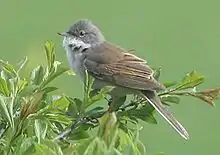
Order: Passeriformes Family: Sylviidae
- Eurasian blackcap, Sylvia atricapilla A
- Garden warbler, Sylvia borin A
- Barred warbler, Sylvia nisoria A, rare
- Lesser whitethroat, Sylvia curruca A, rare
- Common whitethroat, Sylvia communis A
- Subalpine warbler, Sylvia cantillans A, rare
- Sardinian warbler, Sylvia melanocephala A, rare
Grasshopper warblers
Order: Passeriformes Family: Locustellidae
- Common grasshopper warbler, Locustella naevia A
Reed warblers
-2.jpg.webp)
Order: Passeriformes Family: Acrocephalidae
- Icterine warbler, Hippolais icterina A, rare
- Melodious warbler, Hippolais polyglotta A, rare
- Aquatic warbler, Acrocephalus paludicola A, rare
- Sedge warbler, Acrocephalus schoenobaenus A
- Marsh warbler, Acrocephalus palustris A, rare
- Eurasian reed warbler, Acrocephalus scirpaceus A, rare
- Great reed warbler, Acrocephalus arundinaceus A, rare[8]
Treecreepers
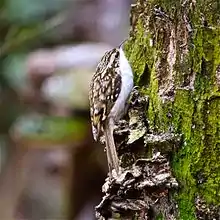
Order: Passeriformes Family: Certhiidae
- Eurasian treecreeper, Certhia familiaris A
Starlings
Order: Passeriformes Family: Sturnidae
- Common starling, Sturnus vulgaris A
- Rosy starling, Pastor roseus A, rare
Thrushes
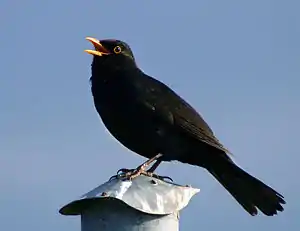
Order: Passeriformes Family: Turdidae
- Ring ouzel, Turdus torquatus A
- Blackbird, Turdus merula A
- Fieldfare, Turdus pilaris A
- Song thrush, Turdus philomelos A
- Redwing, Turdus iliacus A
- Mistle thrush, Turdus viscivorus A
Flycatchers and chats
.jpg.webp)
Order: Passeriformes Family: Muscicapidae
- Spotted flycatcher, Muscicapa striata A
- Robin, Erithacus rubecula A
- Thrush nightingale, Luscinia luscinia A, rare
- Common nightingale, Luscinia megarhynchos A, rare
- Bluethroat, Luscinia svecica A, rare
- White-throated robin, Irania gutturalis A, rare
- Black redstart, Phoenicurus ochruros A
- Common redstart, Phoenicurus phoenicurus A
- Whinchat, Saxicola rubetra A
- Siberian stonechat, Saxicola maurus A, rare[8]
- European stonechat, Saxicola rubicola A
- Northern wheatear, Oenanthe oenanthe A
- Black-eared wheatear, Oenanthe hispanica A, rare
- Desert wheatear, Oenanthe deserti A, rare
- Red-breasted flycatcher, Ficedula parva A, rare
- European pied flycatcher, Ficedula hypoleuca A, rare
Sparrows
Order: Passeriformes Family: Passeridae
- House sparrow, Passer domesticus A
- Eurasian tree sparrow, Passer montanus A
Wagtails and pipits
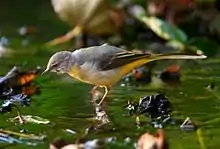
Order: Passeriformes Family: Motacillidae
- Yellow wagtail, Motacilla flava A, rare
- Grey wagtail, Motacilla cinerea A
- White wagtail (pied wagtail), Motacilla alba A
- Richard's pipit, Anthus richardi A, rare
- Tawny pipit, Anthus campestris A, rare
- Olive-backed pipit, Anthus hodgsoni A, rare
- Tree pipit, Anthus trivialis A, rare
- Pechora pipit, Anthus gustavi A, rare
- Meadow pipit, Anthus pratensis A
- Red-throated pipit, Anthus cervinus A, rare
- Eurasian rock pipit, Anthus petrosus A
- Water pipit, Anthus spinoletta A, rare
Finches
.jpg.webp)
Order: Passeriformes Family: Fringillidae
- Common chaffinch, Fringilla coelebs A
- Brambling, Fringilla montifringilla A
- European greenfinch, Chloris chloris A
- European serin, Serinus serinus A, rare
- European goldfinch, Carduelis carduelis A
- Eurasian siskin, Spinus spinus A
- Common linnet, Linaria cannabina A
- Twite, Linaria flavirostris A
- Lesser redpoll, Acanthis cabaret A
- Common redpoll, Acanthis flammea A, rare
- Arctic redpoll, Acanthis hornemanni A, rare
- Red crossbill, Loxia curvirostris A
- Common rosefinch, Carpodacus erythrinus A, rare
- Eurasian bullfinch, Pyrrhula pyrrhula A, rare
- Hawfinch, Coccothraustes coccothraustes A, rare
Longspurs and arctic buntings
Order: Passeriformes Family: Calcariidae
- Snow bunting, Plectrophenax nivalis A
- Lapland longspur (Lapland bunting), Calcarius lapponicus A, rare
Buntings and relatives
%252C_Gatchina%252C_Russia.jpg.webp)
Order: Passeriformes Family: Emberizidae
- Song sparrow, Melospiza melodia A, rare
- White-throated sparrow, Zonotrichia albicollis A, rare
- Yellowhammer, Emberiza citrinella A
- Cirl bunting, Emberiza cirlus A, rare
- Ortolan bunting, Emberiza hortulana A, rare
- Rustic bunting, Emberiza rustica A, rare
- Little bunting, Emberiza pusilla A, rare
- Common reed bunting, Emberiza schoeniclus A
- Black-headed bunting, Emberiza melanocephala A, rare
- Corn bunting, Emberiza calandra A, rare
- Baltimore oriole, Icterus galbula A, rare
- Yellow-rumped warbler, Dendroica coronata A, rare
See also
References
Footnotes
- Fitzpatrick, Mark. Isle of Man, fatbirder.com. Accessed 7 August 2012.
- Garrad, Larch S. (1972) The Naturalist in the Isle of Man, David & Charles, Newton Abbot.
- Manx National Heritage (2012) The Work of the Observatory. Accessed 7 August 2012.
- Gill, F. & D. Donsker, eds. (2012) IOC World Bird Names (v 3.1). Accessed 7 August 2012.
- BOU (2011) The British List. Accessed 7 August 2012.
- Manx Birdlife (2009) The Manx List 2009 - Categories A, B and C Archived 31 December 2013 at the Wayback Machine. Accessed 7 August 2012.
- Manx Birdlife (2009) The Manx Bird List - 2009 Archived 25 June 2012 at the Wayback Machine. Accessed 7 August 2012.
- Birdguides (2012) Online Guide to Rarer British Birds. Accessed 7 August 2012 [Subscription required].
General references
- Manx Birdlife (2009) The Manx List 2009 - Categories A, B and C. Accessed 7 August 2012.

